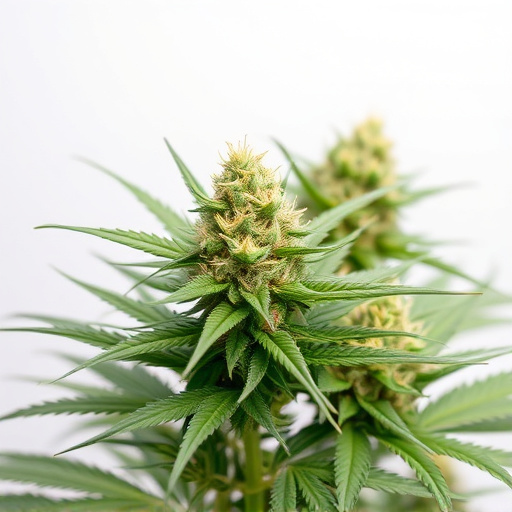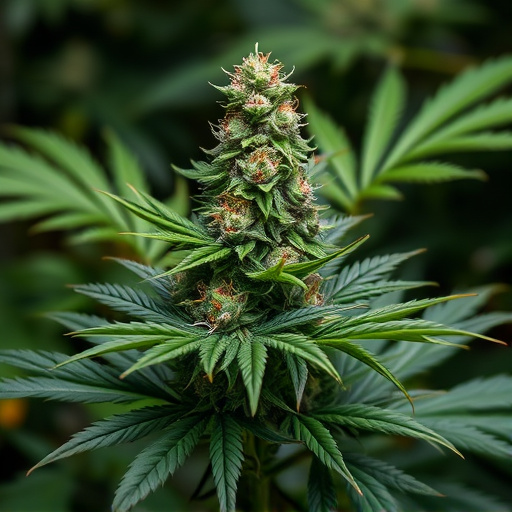Understanding cannabis genetics is crucial for unlocking the full potential of medicinal cannabis. Genetic factors, including cannabinoids, terpenes, and flavonoids, interact with the body's endocannabinoid system (ECS) to determine each strain's therapeutic effects. Breeders use this knowledge to cultivate specific traits tailored to address various health concerns, resulting in a diverse range of medicinal cannabis strains. By focusing on attributes like pain relief or anxiety reduction, breeders create specialized varieties that align with patient needs, offering precise treatment options and enhanced care.
“Unravel the secrets behind the powerful potential of medicinal cannabis with our comprehensive guide to original cannabis genetics. Understanding the intricate web of genetic diversity is key to unlocking the full scope of this therapeutic plant. From the fundamental building blocks that define strain characteristics to the specific traits catering to diverse medical needs, this article illuminates how original genetics shape the future of medicinal cannabis treatment. Dive into the fascinating world where science and nature converge.”
- Understanding Cannabis Genetics: The Building Blocks of Medicinal Strains
- Unlocking the Potential: How Original Genetics Shape Medicinal Cannabis
- Exploring Specific Traits: Benefits and Applications of Distinct Genetic Lines in Medicinal Cannabis Strains
Understanding Cannabis Genetics: The Building Blocks of Medicinal Strains

Understanding Cannabis Genetics: The Building Blocks of Medicinal Strains
Cannabis genetics are the foundation upon which medicinal cannabis strains are built. Each plant’s unique combination of cannabinoids, terpenes, and flavonoids determines its therapeutic potential and distinctive effects. These chemical compounds interact with our bodies’ endocannabinoid system (ECS), playing a crucial role in regulating various physiological processes like pain sensation, appetite, mood, and memory. By studying and cultivating specific genetic traits, breeders can develop medicinal cannabis strains tailored to address particular health concerns.
The intricate dance of genes gives rise to the diverse profiles we see in modern medicinal cannabis strains. Some plants may accumulate higher levels of CBD (cannabidiol), known for its anti-inflammatory properties and non-psychoactive effects. Others might produce more THC (tetrahydrocannabinol), responsible for the plant’s psychoactive attributes but also effective in managing pain and stimulating appetite. This genetic diversity allows for a wide array of strains, each offering unique benefits to those seeking alternative medicine.
Unlocking the Potential: How Original Genetics Shape Medicinal Cannabis

Unlocking the potential of medicinal cannabis lies in understanding its genetic makeup, particularly original genetics. These are the foundational traits that give rise to diverse cannabinoid profiles and unique therapeutic qualities within different strains. By cultivating and selecting plants with specific original genetics, breeders can create or enhance medicinal cannabis strains tailored to address particular health concerns.
This precision approach leverages the vast potential of cannabinoids like THC and CBD, as well as other terpenes and flavonoids. Original genetics play a pivotal role in dictating these chemical compositions, influencing not only the potency but also the overall efficacy and specific effects on the body. Thus, they are crucial in developing cannabis strains for various medical applications, from pain management to anxiety relief and more.
Exploring Specific Traits: Benefits and Applications of Distinct Genetic Lines in Medicinal Cannabis Strains

Exploring specific traits through distinct genetic lines offers immense benefits in cultivating high-quality medicinal cannabis strains. By focusing on particular genetic attributes, breeders can create varieties tailored to meet diverse patient needs and preferences. For instance, some strains may excel in providing potent pain relief, while others might be renowned for their calming effects or ability to stimulate appetite.
This trait-focused approach allows for the development of specialized medicinal cannabis strains. For example, patients seeking treatment for anxiety could benefit from a strain known for its sedative properties and low THC levels. Conversely, those dealing with chronic pain might prefer a high CBD strain with minimal psychoactive effects. Such diversity ensures that patients can access cannabis varieties aligned precisely with their medical requirements, enhancing the overall effectiveness of medicinal cannabis therapies.
Original cannabis genetics are the foundation of all medicinal cannabis strains, shaping their unique characteristics and therapeutic potential. By understanding these genetic traits and their impact, growers and researchers can continue to unlock new benefits for patients worldwide. The exploration of distinct genetic lines allows for the development of specialized strains tailored to specific medical needs, ensuring that medicinal cannabis remains a powerful and versatile resource in the future.














